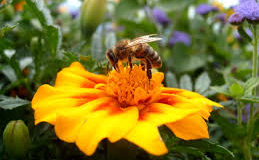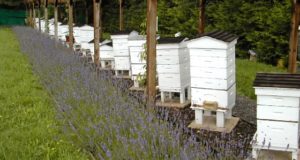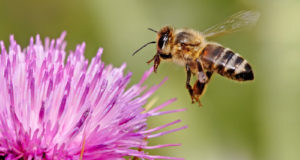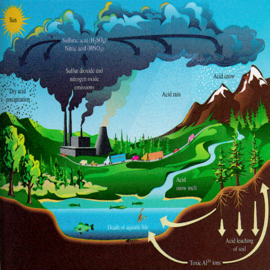
Life is creative and resilient despite the adversity of ecological niche, same with the human mind.
What does it mean to discover a new science paradigm while dwelling in a religious state?
During the last four decades a Sudanese Researcher has been developing, in his spare time by self teaching, a major scientific theory, which he calls quantum information biology (QIB). QIB is the study of bio-systems as spontaneous self-organizing dynamical systems. It is about unifying physics with biology, and revealing the fundamental laws that describe biotic evolution and development. This can be achieved on the basis that life (genome) is a quantum information fractal field (QIFF) which generates, in addition to electromagnetic waves, self-sustained bio-information oscillations through successive generations. Genome’s bio-information is about phenotype; it is a measure of developmental functional complexity and has the dimensions of energy and information. QIFF is a nested hierarchy of bio-information attractors toward which a biosystem develops or evolves. The QIFF’s equations that describe biotic evolution and development admit limiting transition to linear reversible quantum mechanics. Thus ordinary physics is special case of the fundamental laws which describe life phenomenon.
What is the reaction of the scientific journals? From 1970 to 2010 the theory had been rejected more than 30 times for being premature. The Researcher thanks numerous anonymous reviewers in the journals, Theoretical Biology, Biosystems, Ecological Modeling, etc. whose critical comments helped him to overcome the flaws and inadequacies of his proposed theory. He sends special thanks to Robert Ulanowvicz, Sven Eric Jorgensen and the late Mahgoub Obied Taha. From 2010 onwards different phases of the Researcher’s scientific theory had been published on peer-reviewed international journals.
What is the reaction of the science community? Do scientists and researchers pay attention to the new scientific breakthrough? The answer is no, why? Main stream science or what Thomas Kuhn called in his “Structure of Scientific Revolution” normal science protects itself from intruders who may sabotage the prevailing paradigm and threaten the existing interests. One strategy is that usually the primary focus of scientists is not on what is written rather than from what country, from what university, and who is the author whether a PhD holder or not, whether he or she has more than 10 publications or not. For example if an author is a PhD holder from Harvard University and has more than 10 publications then his or her work is more likely to deserve attention.
On the other hand if an author is from Sudan (Africa), University of Science and Technology (private university unknown to science community), holds an MSc and has four publications, in this case his or her work is more likely to be ignored. If the Researcher is asked who is more eligible to make a scientific contribution? He says he nominates the guy from Harvard; any reasonable person does that, because science is community, tradition and finance, this is why Harvard has an excellent record of scientific contributions. However, there are exceptions, rare? Yes, but significant. Because as Thomas Kuhn emphasized paradigm shifts usually come not from main stream science but from the periphery. More important life is so wise and smart that it does not bound creativity, which explains its enormous differentness and diversity; it is creative and resilient -to great extent- despite the adversity of ecological niche. So if we disregard these rare cases we may equally well throw a baby with bath water.
To substantiate his claim about creativity despite adversity, the Researcher emphasizes that the scientific community whether in Harvard, Cambridge or whatever cannot produce (it is a challenge) a solution to the synthesis and unification of physics with biology more elegant and empirically falsifiable than what he has accomplished. According to his proposed QIB, matter has complementary properties, matter waves (de Broglie waves) at high mass density microscopically, i.e., realm of quantum mechanics, and bio-information oscillations at high information density mesoscopically, i.e., realm of QIB. Microscopically, in fact generally, inanimate matter has zero bio-information oscillations, whereas mesoscopically, living systems have approximately zero matter waves. Therefore a material system cannot be described simultaneously by matter waves and bio-information oscillations. Moreover, since the laws of QIB admit limiting transition to linear reversible quantum mechanics, it follows that life phenomenon is neither reducible to ordinary physics nor it is independent of physics. In consequence both reductionism and anti-reductionism are partially correct.
The Researcher thinks that his endeavor and accomplishment is a lesson to remind humanity about what does it mean to be human? A human has unlimited creative potential, all what is needed is to break away from his or her socially programmed self-identity and to tap on life creative potential. How? The personal experience of every individual is part of the universe, so it possesses a universal element. In consequence creativity is the recognition, extraction and unfolding of the universal element embedded in individual experience.
What is the reaction at home? According to Sudanese religious state ideology life is a supernatural phenomenon. On this basis to regard life natural phenomenon subject to Darwinian evolution is nothing less than blasphemy. Nevertheless, the Researcher introduced his theory which had been published on the international peer-reviewed journal Ecological Modeling, 2010, to the Sudanese minister of high education and scientific research and told the Minster about the importance of the discovery and the Researcher’s need to have better research circumstances. Now, five and half years had passed without the Researcher receiving any response, it seems the religious state does not need scientific research. Hence the Researcher, in his spare time by self-teaching, continued developing his work making further scientific breakthroughs despite poverty, loneliness and marginalization.

Source by Elsheikh M Elsheik
 Vitamin Agent The Health & Naturalistic Source
Vitamin Agent The Health & Naturalistic Source





